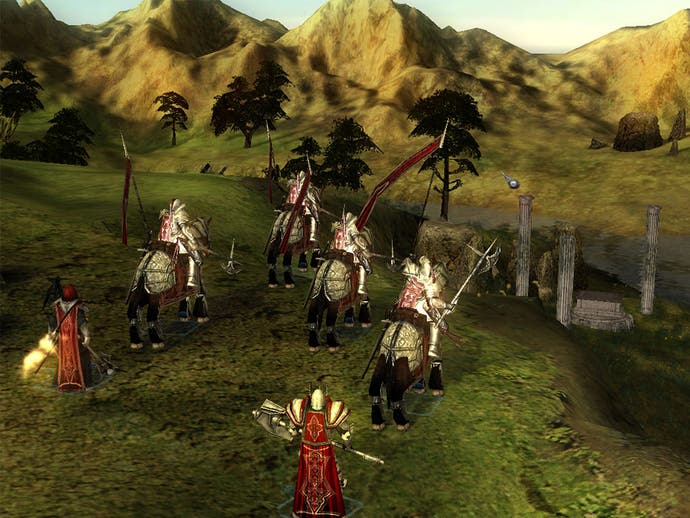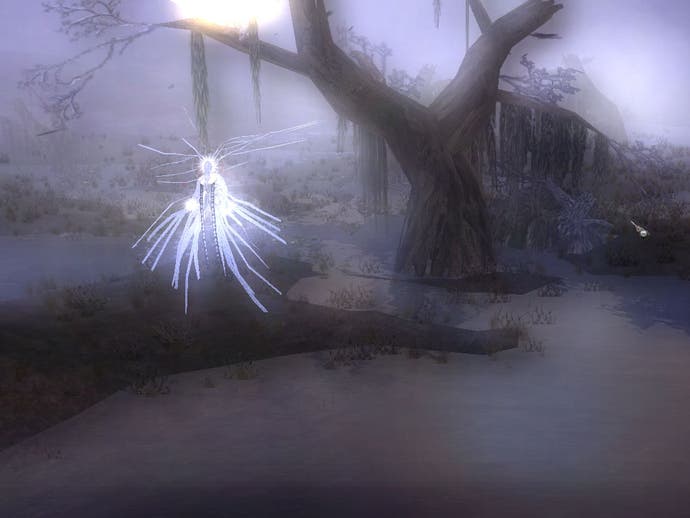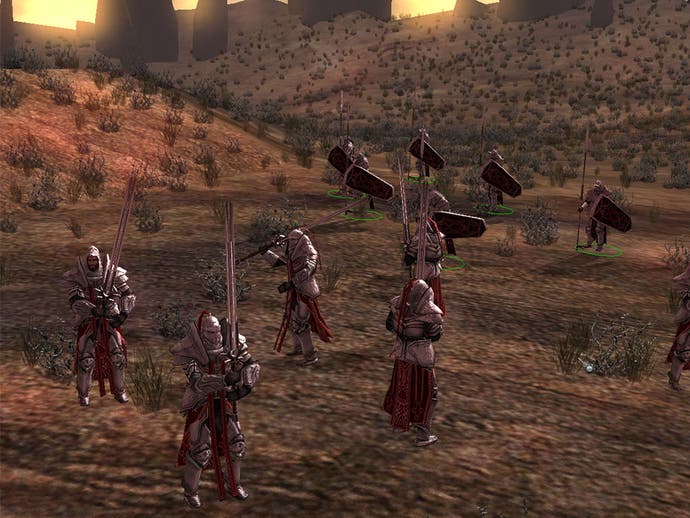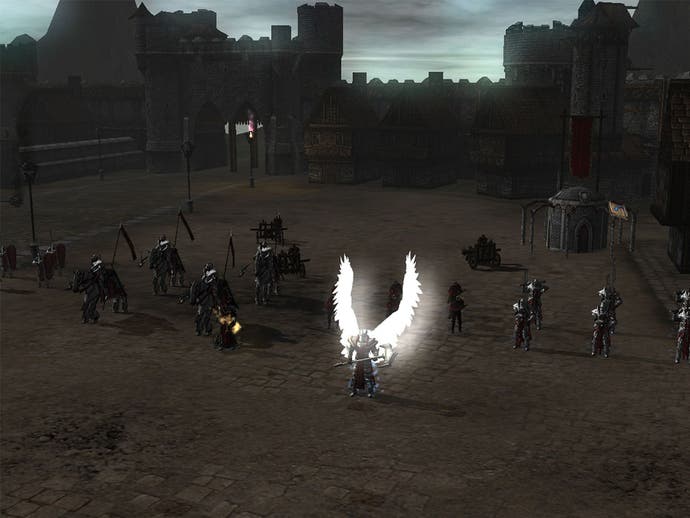Dreamlords
Dreaming up new acronyms with the MMORPRTS.
Okay, admit it - you only clicked on the article because you want to know what on earth an MMORPRTS is (aside from the cack-handed hammering of a chimp on a Fisher Price keyboard, or a rather good tongue twister). We don't blame you - as vocal-cord mashing acronyms go, Swedish developer Lockpick's creation of the Massively Multiplayer Online Role Playing Real Time Strategy is a particularly heinous crime. It is, however, a pretty good summary of exactly what the firm's ambitious new online title Dreamlords actually is - a persistent world online game where you manage a civilisation and battle it out in strategic encounters.
We've been dabbling in the intriguing beta for a couple of weeks now, and in a rather distressing turn for any hack attempting to turn out a preview feature, it defies comparison with almost anything else on the market. Certainly, it's been inspired by a variety of existing games - but trying to describe Dreamlords by pointing out that there are elements of the game which are a bit like Civilization, Starcraft, Everquest and Planetarion is about as unhelpful a sentence as we could possibly conceive of. See? You look confused already. We don't blame you.
Tangled Web
The idea behind Dreamlords is that you are, predictably enough, a Dreamlord - a spiritual being seemingly made of light and party streamers, who embodies the spirit of the land itself. The land in this case is a floating island called a Patria, one of countless such chunks of land created in a cataclysmic magical screw-up which split the world into loads of tiny floating bits. Needless to say, in the process civilisation managed to get itself into a right mess (and people stuck on a patria without a Starbucks on it were presumably properly miffed) - so when your Dreamlord character pops up in a spangly display of luminescent ribbons, your first task will be to get the remnants of civilisation sorted out, build some towns and production facilities, and get an army together that can sort out some of the marauding nasties with whom you share the patria.

This is done using two radically different game interfaces - and herein lies one of the most unique hooks which Dreamlords has on offer. All of the civilisation building tasks - moving your units around the world map, establishing towns, cities and outposts, researching technology and the likes - are carried out not in the game itself, but in a web browser. Despite having an astonishingly advanced interface which sports most of the features you'd expect from a Civilisation style turn-based strategy title, including the ability to drag and drop items and units, and information-laden tooltips about the items you're looking at, the game doesn't use Flash or any other proprietary technology for its web browser interface, and the developers claim that it should work from any computer with web access.
One thing you can't do in the web browser, however, is actually take part in battles - to do that, you'll need to fire up the game client and launch one of the missions or battles you've set up in the web client. These battles are resolved in a fully 3D real-time strategy mode, and once you've won (or lost) you'll find that any spoils of war which you may have, ah, liberated from your enemies are now available in the web interface. Among these spoils might be equipment or abilities for your armies, which you can drag and drop onto unit types to upgrade them, or special objects which boost the statistics of one of your cities.
The thinking behind this novel approach is obvious. Any gamer who worked in an office job in the early part of this decade will undoubtedly remember Planetarion, a fantastic web-game which placed you in charge of the development of a solar system and tasked you with waging warfare against countless other such systems for the valuable assets contained in asteroids which floated around the galaxy. The game was engaging, and its simple graphics were deceptive - there was surprising depth to the whole thing, especially once the politics of alliances started to enter into the mix. Most of all, it was something which people could play on their lunch break, or when the boss wasn't looking; a great multiplayer game that worked in a web browser, at a time when most office computers weren't up to running 3D games even in offices where the IT policies were relaxed enough to allow workers to install them.

Dreamlords, then, is an attempt to take this idea a step further - by allowing you to manage and oversee an entire nation from your office or college, setting up a number of battles along the way by moving your units into close proximity to a nasty fiend. Then, when you get home in the evening, you can fire up your 3D RTS client and enjoy actually playing through the battles in real-time.
Dream a Little Dream
That's the theory, anyway, and it's certainly a sound theory - you can smell the promise of an idea like this a mile off, and bosses up and down the country should fear for their lost productivity if the team at Lockpick can get the execution of the idea right. The beta we've been playing (the full game itself is out now, and we'll be taking a more in-depth look at that in due course) veers dangerously close to getting it perfectly right in some respects - although in others, the team has some distance to go before Dreamlords can really start cutting into the GDP figures of entire industrialised nations.
One thing the game definitely gets right is its races, whose characteristics and play styles are hugely diverse but seem, so far, to be extremely well balanced. Dreamlords borrows unashamedly from Starcraft in this respect. There's the animalistic, inhuman race whose idea of "research" is blood sacrifices and which is bred entirely for war; there's the mystical, emotionless and incredibly technologically advanced race; and then there's the most obviously "human" race, a bunch of religious Crusader-type zealots whose units conform in some respects to comfortable medieval warfare stereotypes. While it's probably advisable to start off with the humans, simply because they're the most familiar and easiest to learn, many players will probably quickly "re-roll" and try out the others, too; half the fun of an RTS is getting to play the other side, and Lockpick has gone to great lengths to ensure that the other sides in Dreamlords play in entertainingly different ways, right down to basic stuff like how they progress through the research trees.

Another solid aspect of the game is how it treats progression - and manages to avoid, to some extent, the common bugbear of MMO titles, which is that people who spend longer playing get more advanced in the game, regardless of actual skill level. Like Planetarion, Dreamlords doles out action points on an ongoing basis - whether you're logged into the game or not - and when you've spent all your action points, which are generally expended by moving units around in the web mode, building stuff in your cities and so on, you're frozen until such time as more points accumulate. If you log in every few hours, you'll have limited points to spend; log in once a week and you can spend a whole week's points at once. Of course, to some extent people who play more often will still have a major advantage - not least since they'll get to play more Player vs Player matches - but it's nothing like the disparity seen in most other MMO style titles.
Moreover, every few months the game will "reset" - another feature lifted from Planetarion - and everyone will have to start their Patria from scratch, which means that new players will never be hopelessly adrift and faced with a game-world where everyone's armies are vastly more powerful than theirs. The only thing which will carry on between resets is your actual Dreamlord character, whose statistics and equipment can be upgraded gradually as you play. A more powerful Dreamlord will enable you to tackle tougher quests and missions, but shouldn't - in theory - confer such a massive advantage that new players won't have a hope against the armies of established players.
Double Life
One aspect of Dreamlords which does feel a little awkward from our beta experience, however, is the 3D RTS client itself. The web browser end of the game is an astonishing feat, and while the interface is extremely complicated, a solid tutorial system got us up and running in it remarkably quickly - the whole thing really does feel like playing a great turn-based nation-building game in a web browser. However, once you open the 3D RTS client to play out a match, the quality of the experience sadly doesn't match the effort that has been put into the web browser client - it's by no means bad, but Lockpick has some work to do in this regard to shore things up, since it feels a bit like a cheap and cheerful second-rate RTS title. The camera controls are awkward, the camera is vastly too zoomed in, and objectives are often vague or poorly marked out - not to mention that combat itself is all too often simply a case of clicking wildly and hoping that you've got more units, and they're bigger and stronger, than what your enemy has.

There's also simply the feeling that early on the game, you spend vastly too much time flicking between the two different interfaces; with only one exploratory unit at your disposal, and loads of encounters to get through before you can really start making progress in the game, you'll end up spending a lot of time alt-tabbing out to the browser, moving your exploration unit around to find another encounter, then alt-tabbing back into the game client to play that encounter. It's clunky and a little awkward - we'd liked to see some basic way to set up new encounters without actually leaving the game client itself, although it has to be said that the further we get into the game, the less aggravating this particular aspect becomes.
The joy of a game like Dreamlords, however, is that these flaws - which would be fatal in a standard RTS game - can actually pale into the background, and this early in the life of the game we can take an optimistic view and say that the potential exists for them to be greatly improved. Building up your patria and your armies is shaping up to be good, solid and really rather addictive fun, which in itself makes Dreamlords into an interesting prospect. Of course, like any such game, it will live or die largely on the strength of its community - and we were pleased to note that the community that built up around the beta was largely mature, good natured and sporting. Whether that continues past the full release of the game is, of course, completely unknown, but perhaps there's a case to be made for RTS-styled titles attracting a better breed of gamer than the phat lewt of WoW (which, I'll grant you, I'm as addicted to as the next man - and the next man is pretty damn hooked).
More than anything else, Dreamlords is ambitious as hell, and that's worth raising a cheer for any day. The core Big Ideas - building a massively multiplayer RTS title, incorporating persistent character development into a nation-building game on a reset timer, combining a turn-based web-game that you can play anywhere with a real-time 3D strategy client to install on your home PC - are all fascinating in their own right, and to see so many of them combined in one game would be genuinely intriguing even if it wasn't for the fact that Lockpick are so obviously downright good at several of these areas. Like any MMO title, Dreamlords will of course develop and evolve greatly - not only between the late-stage beta we've been playing and the now-available launch version, but also over the course of the coming months and years - and the potential for Lockpick to polish the rougher edges of the game to the same extent as its best aspects is one which makes Dreamlords into a game worth watching.


.png?width=291&height=164&fit=crop&quality=80&format=jpg&auto=webp)




.jpg?width=291&height=164&fit=crop&quality=80&format=jpg&auto=webp)
